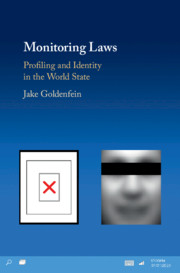Book contents
- Monitoring Laws
- Monitoring Laws
- Copyright page
- Contents
- Acknowledgements
- 1 Monitoring Laws
- 2 The Image and Institutional Identity
- 3 Images and Biometrics – Privacy and Stigmatisation
- 4 Dossiers, Behavioural Data, and Secret Speculation
- 5 Data Subject Rights and the Importance of Access
- 6 Automation, Actuarial Identity, and Law Enforcement Informatics
- 7 Algorithmic Accountability and the Statistical Legal Subject
- 8 From Photographic Image to Computer Vision
- 9 Person, Place, and Contest in the World State
- 10 Law and Legal Automation in the World State
- Index
3 - Images and Biometrics – Privacy and Stigmatisation
Published online by Cambridge University Press: 08 November 2019
- Monitoring Laws
- Monitoring Laws
- Copyright page
- Contents
- Acknowledgements
- 1 Monitoring Laws
- 2 The Image and Institutional Identity
- 3 Images and Biometrics – Privacy and Stigmatisation
- 4 Dossiers, Behavioural Data, and Secret Speculation
- 5 Data Subject Rights and the Importance of Access
- 6 Automation, Actuarial Identity, and Law Enforcement Informatics
- 7 Algorithmic Accountability and the Statistical Legal Subject
- 8 From Photographic Image to Computer Vision
- 9 Person, Place, and Contest in the World State
- 10 Law and Legal Automation in the World State
- Index
Summary
Privacy law, especially in the form of the right to private life in Article 8 of the European Convention of Human Rights, has addressed police photography, biometrics, and filing systems, including when police identification images are taken in public, outside of the context of arrest. The law slowly came to recognise that the building of institutional identity databases was a meaningful and potentially objectionable practice because it could stigmatise people with information in those filing systems who had not been convicted. This chapter outlines the development of that legal constraint on profiling, as well as its limitations, such as expanding law enforcement intelligence practices. It argues that privacy becomes meaningful for government profiling only when the ‘reasonable expectation of privacy’ test is abandoned, and with a focus on data processing, image identification, and ‘systematisation’.
Keywords
Information
- Type
- Chapter
- Information
- Monitoring LawsProfiling and Identity in the World State, pp. 42 - 63Publisher: Cambridge University PressPrint publication year: 2019
